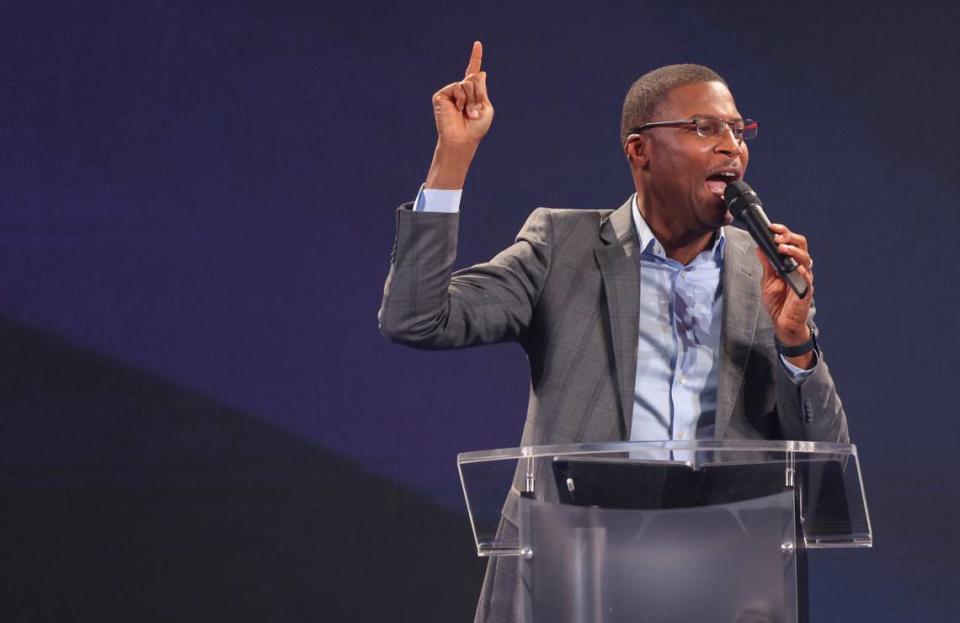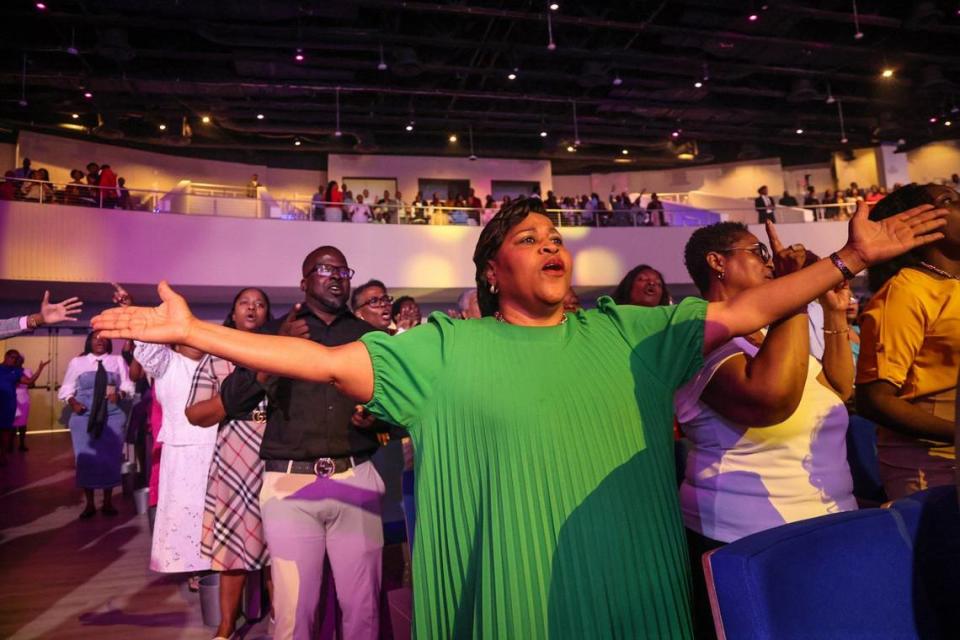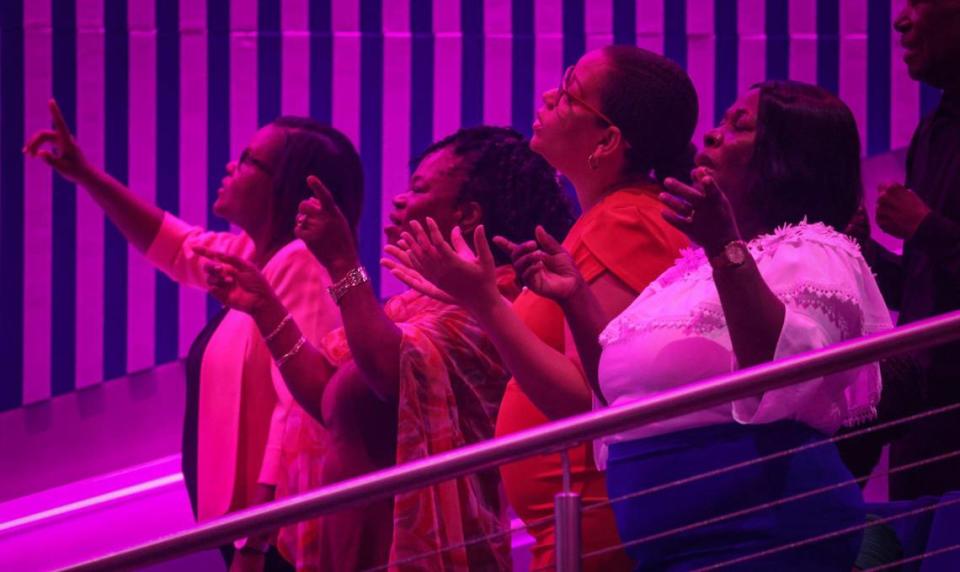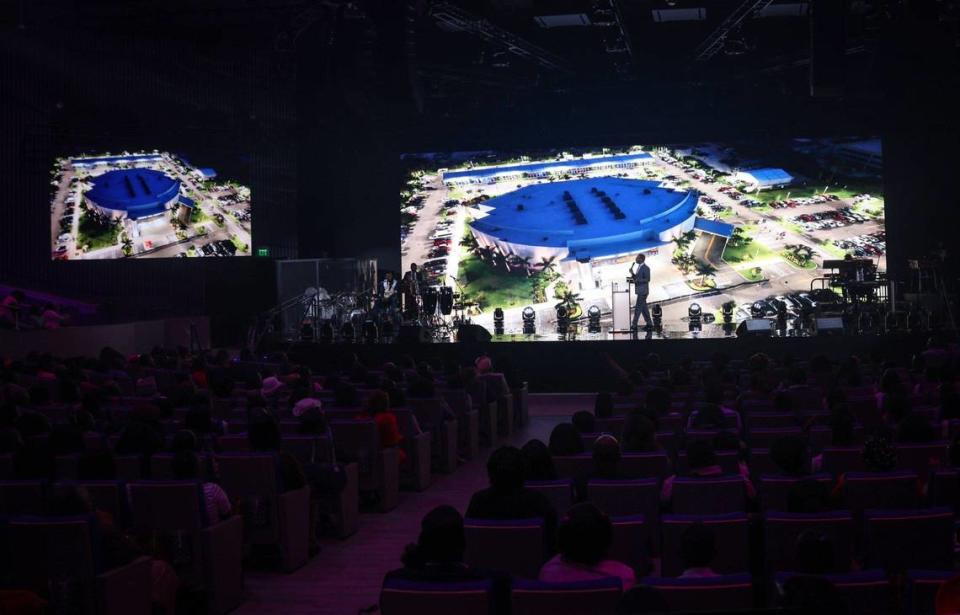Haitian American megachurch, 10 years in the making, opens $60 million campus in Miami
After almost 20 years of conducting services out of homes, banks and local high schools, a multilingual Miami church finally has a place to call home.
Tabernacle of Glory, a nondenominational church with a prominent Haitian American congregation, opened a new $60 million campus in northern Miami-Dade County earlier this month. The 60,000 square-foot church, which sits on a six-acre lot on Northwest 161st Street and Third Avenue, will serve as a headquarters for Tabernacle’s 62 campuses, about half of which are located in Haiti. Other locations are found in parts of the U.S., Canada, the Dominican Republic, France, French Guiana and Chile.
Bishop Gregory Toussaint, 50, senior pastor and CEO of Tabernacle of Glory, said the building solidifies a permanent place for the church in the South Florida community.
“I still haven’t landed yet. I feel like I’m still in the air,” Toussaint said. “We are definitely overjoyed to know now we have a place that is home.”
The church, which offers services in four languages — French, Haitian Creole, English and Spanish — had humble beginnings. It started in 2005 with members meeting in Miramar homes, according to Toussaint. Then for about nine years services were held inside a leased space at North Miami’s Bank of America building, and then for the next decade at North Miami Senior High School.
Tabernacle purchased its current plot of land in 2015 for $1.1 million, according to Miami-Dade property records, and the church began fundraising for the construction costs shortly after. The effort was national, with all of Tabernacle’s campuses contributing to the campaign, as well as their online members, according to church leaders.
The completed church also marks an important milestone for the Haitian diaspora, said Toussaint, who has been a vocal leader in uniting Haitians to speak out against the country’s political violence.
“It required vision, it required leadership, but over time, we were able to get it done. And it wasn’t somebody else who did it for us. We did it,” Toussaint said.

The North Miami campus — the term Tabernacle leaders use to refer to its churches — currently has a 4,000-seat main fellowship hall with a large stage, professional sound booth and lighting system. There are also classrooms used for religious schooling, which church leaders say will be expanded into a larger school in the future, various studios for media production, and a translation booth.
The campus inauguration ceremony, held on July 5, attracted thousands of attendees, including notable figures such as Miami-Dade County Mayor Daniella Levine Cava, county commission Chairman Oliver G. Gilbert III, and Commissioner Marleine Bastien.
Levine Cava shared words of support for the church with the Miami Herald, recognizing Toussaint’s efforts in “engaging and uplifting” the Haitian-American community in North Miami while building a “modern and dynamic congregation.”
Gilbert said the church has “made a profound impact in the North Miami community,” calling Toussaint’s efforts to raise awareness for Haiti’s political situation “commendable” and inspiring.
March for Haiti
The $60 million campus was completed just a year after Toussaint, who was born and raised in Haiti until he was a teenager, led a nation-wide prayer movement and march for Haiti to raise awareness about the escalating gang violence and kidnappings in the Caribbean country. Toussaint organized the march after receiving over 120,000 signatures on a petition urging Congress to pass legislation calling for financial sanctions against those supporting criminal gang activities in Haiti.
“We felt that it was important that there was an event that brought everybody together, Haitians outside of Haiti and in Haiti, around one concern,” Toussaint said. “And make a statement of unity and remind ourselves that we are fighting for the same cause.”
Toussaint, a pastor with an emphatic preaching style, is a prominent religious leader in the Haitian community. His media company, Shekinah.fm, has a YouTube channel with almost 900,000 followers, and his Sunday sermons are streamed by millions online. (Shekinah is a Hebrew word meaning to “dwell,” often used to identify the presence of God on Earth).
During the week of the new church’s inauguration, which coincided with Tabernacle’s annual 40-day fasting event and a 10-day conference, Toussaint said the larger Haitian American community — members and nonmembers of Tabernacle — showed up online and in person to share how they felt about the church.
“What I did not foresee is the sense of pride,” Toussaint said. “On social media that’s probably the most popular comment, that Haitians really felt proud of what we were able to do as a community.”

Toussaint said he sees the new campus not only as an accomplishment for the Miami community but as a win for Haitians everywhere.
“The international community had to intervene in Haiti because Haitians simply can’t get their act together to solve their problems … And the construction of this building seems to send the opposite message — we can get ourselves together to get stuff done,” Toussaint said. “And this building is a testimony of that.”
However, the significant cost to build the campus has sparked mixed opinions on social media and elsewhere, according to The Haitian Times. Some have expressed concerns about the use of the money, arguing that it could have been used as more of a direct investment into the Haitian economy.
Church leaders at Tabernacle said the campus will be used for much more than a spiritual meeting place — among the plans are a residential property for mixed income families, a K-12 faith-based school, a credit union and a medical clinic.
A changing religious landscape
Tabernacle’s popularity in the Haitian community reflects a larger religious shift for Haitians, who are one of the most religiously active immigrant groups in the United States, according to research by Florida International University professor Alex Stepick and Temple University professor Terry Rey.
Traditionally, Haiti has been a predominantly Roman Catholic country, largely due the country’s birth out of French colonialism, but also because of the support the Catholic Church has shown Haiti in the past. Pope John Paul II visited Haiti in 1983, for example, and openly denounced the decades-long oppressive regime led by Jean-Claude “Baby Doc” Duvalier, who was overthrown in an uprising years later. The Catholic presence in Haiti remains strong, with 10 dioceses and over 250 parishes. But, in recent years, Protestant churches have seen significant growth in Haiti and in South Florida.

Toussaint believes the success of Tabernacle of Glory’s congregation has more to do with the modern way the church practices their faith compared to more traditional denominations.
“People want to feel that beyond doctrine and rules and principles, that there is a spiritual connection with God,” he said. “So the kind of churches that really put a lot of emphasis on the immediate connection with God do see a change of growth all across the board.”
Toussaint developed an interest in pastoral work at the age of 15 while attending a Pentecostal church in Brooklyn, New York. He received a Master of Theology degree from Dallas Theological Seminary and studied New Testament theology at the Theological Faculty of Vaux-sur-Seine in France. Toussaint also takes his non-religious studies seriously — he holds a bachelor’s degree in accounting and has a master’s in international law from St. Thomas University.
Though Tabernacle isn’t part of an official denomination, Toussaint said its style of Christianity would fall under what he calls neo-Pentecostal, a version of the Pentecostal denomination, which traditionally involves speaking in tongues and laying of hands on someone receiving the Holy Spirit. On a recent Sunday at Tabernacle, a video was shown to the congregation compiling moments of what looked like members being healed through prayer, with people sometimes falling to the floor and crying out as the pastors continued to pray away their afflictions.
It’s that emphasis on what Toussaint refers to as the “supernatural,” or the ability for God to intervene in someone’s life through miracles, that keeps people coming back, he said.
“People want to know: What difference does God make in my life? When they feel that ‘I’m getting supernatural help in my everyday life,’ people tend to gravitate towards that kind of teaching.”

This story was produced with financial support from Trish and Dan Bell and from donors comprising the South Florida Jewish and Muslim Communities, in partnership with Journalism Funding Partners. The Miami Herald maintains full editorial control of this work.

